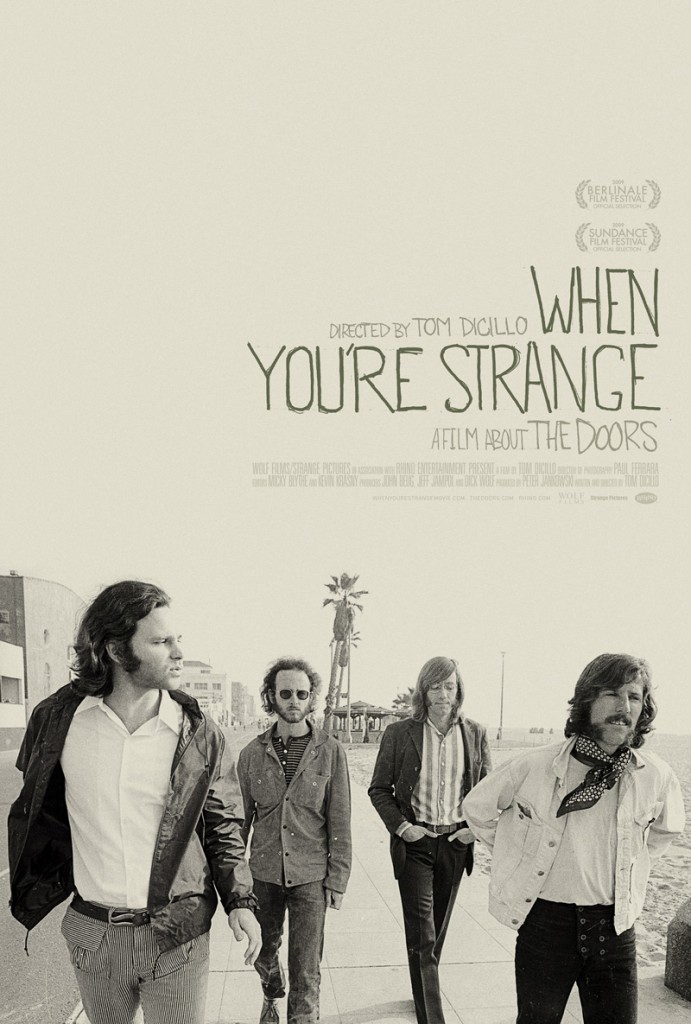By Robert Sims, Special to TheMovieKit.com
 Like many charismatic singers who died sad and untimely deaths, Jim Morrison continues to live on in the collective hearts and minds of rock fans the world everywhere. Director Tom DiCillo’s When You’re Strange: A Film About The Doors attempts to set the record straight about rock’s poetic laureate’s life, death and musical legacy.
Like many charismatic singers who died sad and untimely deaths, Jim Morrison continues to live on in the collective hearts and minds of rock fans the world everywhere. Director Tom DiCillo’s When You’re Strange: A Film About The Doors attempts to set the record straight about rock’s poetic laureate’s life, death and musical legacy.
With narration by Johnny Depp, the documentary details The Doors’ formation, its rise to glory, Morrison’s descent into drugs and alcohol, and the band’s failed efforts to soldier on following his 1971 death in Paris. More important, When You’re Strange boasts footage of The Doors never before seen — shot between 1965 and 1971 — and excerpts from HWY, a film Morrison made several years before his death.
Prior to its theatrical release, Doors guitarist Robby Krieger brought the film to SXSW and told the documentary’s audience during a post-screening Q&A about how Morrison influenced his songwriting, his reaction to his band mate’s death, and the bids to replace him with a new singer.
Step 1: Find the footage
Robby Krieger: “Most of it was shot by a guy named Paul Ferrara, who came on tour with us, just followed us around whenever we went. Wish we had more of it, but it’s all we’ve got. So lucky we have it.”
Step 2: Pay homage to a fallen comrade
Krieger: “Jim was a mentor to me. He kinda taught me how to write songs, at least the words. What was my most favorite story about that was probably at one time I was still living at home and my parents left town for a couple weeks, so I had Jim stay over at my house, which might have been a mistake. We had a great time writing song, and that’s where we wrote a whole buncha stuff, including ‘The End.’ ‘The End’ was just a love story when we first started. It was just, ‘This is the end, beautiful friend,’ and as we played it in person, it would get longer and longer until that night at [the LA nightclub Whiskey a Go Go], when the Oedipal part came out.”
Step 3: Recall the first meeting with Morrison
Krieger: “Jim was always weird, you know, from the very first time I met him. We had our very first rehearsal — he was very cool, the music was great. After the rehearsal, some guy comes in and Jim grabs him, throws him in this room, and it sounded he was going to kill the guy or something. ‘Jesus Christ, this is my lead singer?’ Turned out it was this dope was a dope dealer, a bad dealer.”
Step 4: Don’t speculate
Krieger: “We don’t really know exactly what happened because he was over there in Paris, and Pam [Courson] was the only one who really knew what happened, and unfortunately she died about a year later. She was totally heartbroken and got into hard drugs and she was gone in a year. It was terrible.”
Step 5: Realize hindsight is 20/20
Krieger: “In a way I wasn’t surprised because, you know, it seemed like he was always trying his hardest to crash his car or jump out of a window or something. But then again I always thought he’d be one of those guys, those crazy Irish drunks who’d live to be 80 years old and just never give up, give up the ghost. But I was wrong.”
Step 6: Accept that life goes on
Krieger: “The three of us continued to record after Jim died. We did two albums and we thought about getting a lead singer but it really didn’t make sense right away, but after the second album we did we said, ‘God, Ray and I are not the greatest singers, so on, we should get a singer, it’s been two years, three years.’ So we actually went over to London. We all moved over to London: ‘Maybe we’ll find a singer over here.’ And we talked about Iggy Pop and we never did get around to trying him out. I don’t know whether he would have wanted to do it or not. [Audience’s] Howard Werth was one of the guys that we talked about. The guy from Free, Paul Rodgers. But we never really got to try anyone out because Ray’s friend was pregnant and she kinda freaked out and Ray decided to go back to L.A., and that’s when the three of us kinda broke up The Doors, in 1972, 1973.”
Step 7: Dissect Hollywood’s version of The Doors’ brief reign
Krieger: “I did like The Doors movie. I worked on it as an advisor, and if you remember the part about when we wrote ‘Light My Fire,’ that was kinda my idea that I asked Oliver to do, and I basically wanted the musical parts of the movie to be true to life, and they really were. They really tried hard to recreate the concert scenes in that movie, as true to life a possible. There was some stupid stuff in the movie, but I thought for a Hollywood movie about rock ‘n’ roll it was pretty damn good.”

